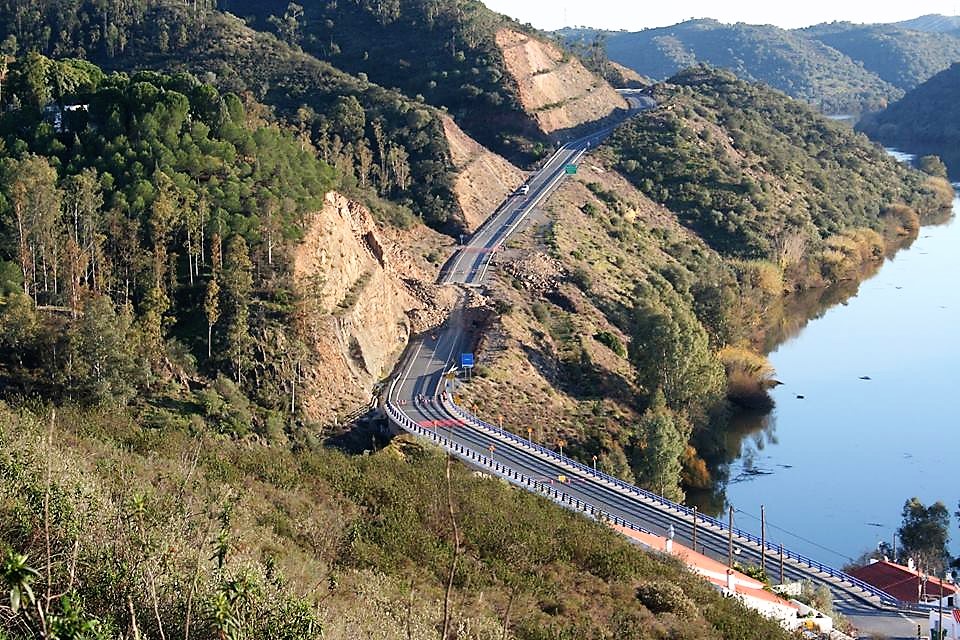 The road that gives access to the Baixo Guadiana International Bridge (Chança bridge) has been closed to traffic since December 5, due to a landslide on the Spanish side of the border.
The road that gives access to the Baixo Guadiana International Bridge (Chança bridge) has been closed to traffic since December 5, due to a landslide on the Spanish side of the border.
A situation that is being strongly contested by the forces of the locality of Pomarão (Mértola) and the Spanish municipality of El Granado (Huelva), who have already created a platform to demand the authorities of the neighboring country to speed up the reopening of the road, since , they say, the situation is having strong negative effects, not only on an economic level, but also on a social level.
On Saturday, March 11, more than a hundred small businessmen and people from the two border towns gathered in protest near the site of the collapse, a few hundred meters from the bridge that was opened in 2009.
This work cost around 2 million euros and was paid jointly by the Mértola City Council and the Provincial Council from Huelva, who provided 25 percent of the amount, with the remaining 75 percent paid by the European Union.
For the mayor of Mértola Jorge Rosa, the situation "had to be resolved", taking into account that the landslide "happened almost four months ago".
“It gives the impression that there is some inertia, some inattention, on the Spanish side. The situation could already be resolved, even because they have Regional Governments, which allows them to act more quickly," considered the mayor of Mertolense, in statements to the Sul Informação.
Proof of this, he says, is that, at the same time as the subsidence on the Spanish side, «the same happened on the Portuguese side, although there was not so much land». “In a few days, the Mértola City Council cleaned the road and re-established road traffic. This was not spoken because it was quickly resolved», he assured.
Jorge Rosa has been in contact with the neighboring municipality of El Granado and with the Regional Government in Huelva, who have provided him with “some information, but not very substantial”. “I was told that studies were being carried out to assess the stability of the rock, next to the road. As far as I know, the result of the study has already been delivered and there will be no risk of collapse. They tell me that a company will start cleaning work in April,” he said.
Already Hispanic-Portuguese platform of those affected by the closure of the Ponte Internacional do Chança, who called last week's protest, stated that the Provincial Council de Huelva reportedly said, in January, that the cut would remain at least until the end of the summer, depending on the result of geotechnical studies, "which should be ready within six weeks".
On the other hand, the work will also depend “on the availability of government funds to face environmental catastrophes”.
“But after three months, the situation has not only changed, it has worsened, as the viaduct is of vital importance for the cross-border trade flow and for the development of both Andévalo [historic region of Andalusia where El Granado is located] , as in Baixo Alentejo”, illustrated the platform, in the call for last week's protest.
“This passage reduced by 180 kilometers the distance that had to be traveled by road between the two villages. Because of this cut, many people are living in a precarious situation that had disappeared with the opening of the bridge, in 2009,” they assure. In addition to the economic aspect, the roadblock has repercussions «on a social and cultural level».
The mayor of Mértola confirms that the situation is having serious consequences, since "there has been a drop in movement and consumption in local commerce, on the left side of Rio", taking into account that there were many who crossed the border , to come to Portugal.
“The Spaniards are also very sorry, as there were many people from here who crossed the border, looking for products that are more worthwhile to buy there, such as gas or fuel. It is affecting trade,” he illustrated.
The March 11 protest served to "demand an immediate solution to this serious problem", as the members of the platform do not understand "how a viaduct of such importance can be subjected to a situation of this nature for so long, without there is a clear response from the authorities'.
Jorge Rosa has a similar feeling, who has been working on several fronts, to try to speed up the process. In addition to contacts with the Spanish authorities, the mayor of Mertolense has already met with Secretary of State for Infrastructure Guilherme d'Oliveira Martins and asked him to intercede with his Spanish counterpart. "As far as I know, that contact has not yet been made, despite the meeting being held about a month ago," he said.


















Comments